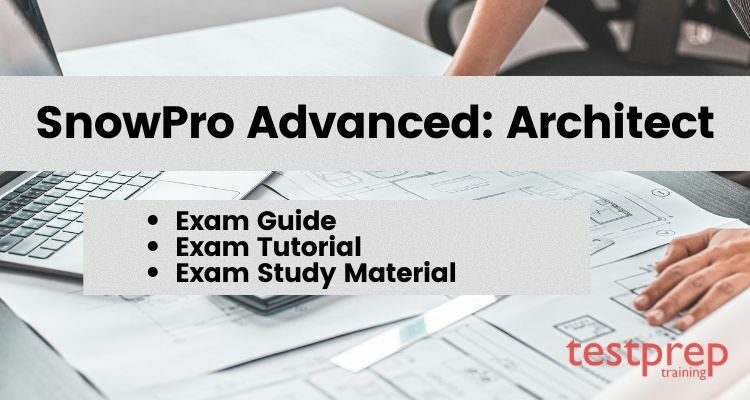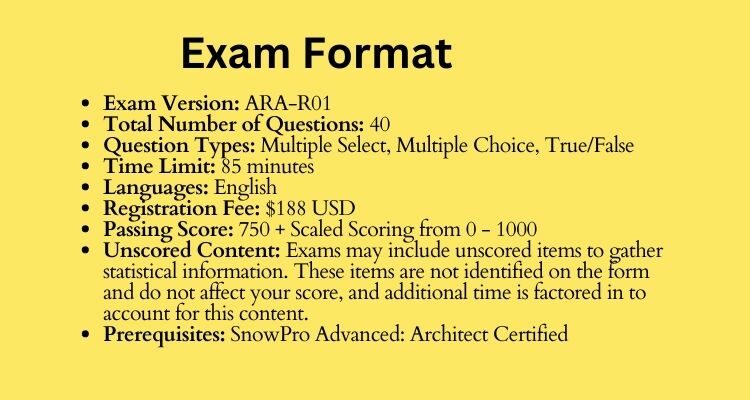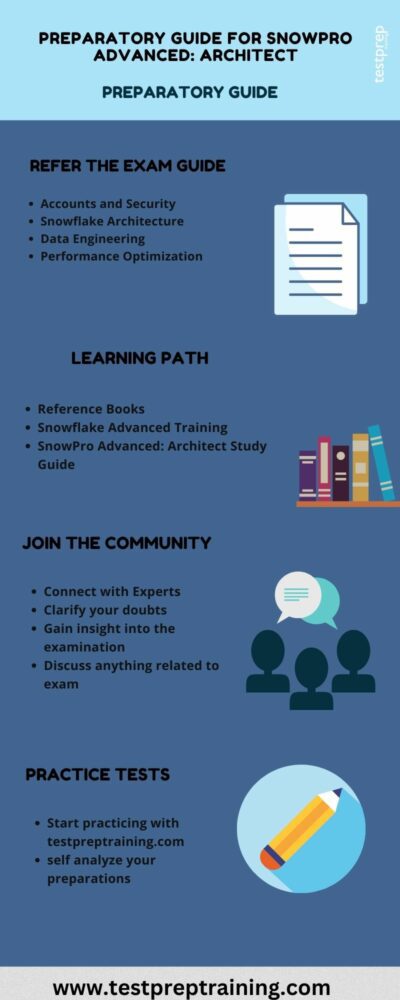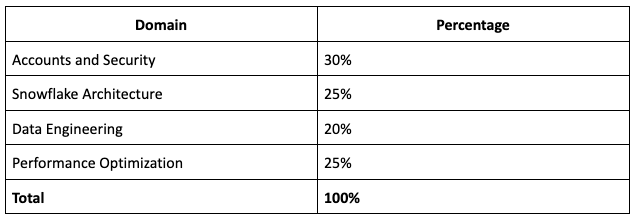SnowPro Advanced: Architect

Candidates must complete the SnowProTM Advanced: Architect test before they can use Snowflake to design comprehensive architect solutions.
This certification will evaluate your skills in relation to:
- Design an end-to-end data flow from source to consumption using the Snowflake data platform.
- Design and execute a data architecture that satisfies all ethical, commercial, and security requirements. To enhance the performance of the architecture, choose the proper Snowflake and third-party tools.
- Create and share a shared data set by using the Snowflake Data Marketplace and Data Exchange.
Target Audience
The SnowPro Advanced: Architect exam is specially designed for :
- Solution Architects
- Database Architects
- System Architects
Exam Format

Exam Registration
The Pearson Vue platform is used to offer the Snowflake SnowPro Certification examinations, which can be taken on-site at any of the more than 1000 testing locations around the world or remotely from home with a virtual proctor.
- To create an account, go to the Snowflake Certification Portal and click “Create New Profile.” Your official ID or passport should have the same first and last names as you. Please enter a. in the last name field if you don’t have a last name. Your profile’s address will be used to determine the timezone you are in.
- After reading the Snowflake Certification Terms and Conditions, fill out all the necessary fields. If you don’t accept the terms, you won’t be able to register an account.
- Then select “Create Account.”
Course Outline
The SnowPro Advanced: Architect covers the following topics:
Domain: Account and Security: 30%
1.1 Designing a Snowflake account and database strategy, based on business requirements.
- Create and configure Snowflake parameters based on a central account and any additional accounts.
- List the benefits and limitations of one Snowflake account as compared to multiple Snowflake accounts.
1.2 Understanding an architecture that meets data security, privacy, compliance, and governance requirements.
- Configure Role Based Access Control (RBAC) hierarchy
- System roles and associated best practices
- Data Access
- Data Security
- Compliance
1.3 Outlining Snowflake security principles and identify use cases where they should be applied.
- Encryption
- Network security
- User, Role, Grants provisioning
- Authentication
Domain:Snowflake Architecture: 25%
2.1 Outlining the benefits and limitations of various data models in a Snowflake environment.
- Data models
2.2 Designing data sharing solutions, based on different use cases.
- Use Cases
- Sharing within the same organization/same Snowflake account
- Sharing within a cloud region
- Sharing across cloud regions
- Sharing between different Snowflake accounts
- Sharing to a non-Snowflake customer
- Sharing Across platforms
- Data Exchange
- Data Sharing Methods
2.3 Creating architecture solutions that support Development Lifecycles as well as workload requirements.
- Data Lake and Environments
- Workloads
- Development lifecycle support
2.4 Understanding a scenario, outline how objects exist within the Snowflake Object hierarchy and how the hierarchy impacts an architecture.
- Roles
- Warehouses
- Object hierarchy
- Database
2.5 Determining the appropriate data recovery solution in Snowflake and how data can be restored.
- Backup/Recovery
- Disaster Recovery
Domain: Data Engineering: 20%
3.1 Determining the appropriate data loading or data unloading solution to meet business needs.
- Data sources
- Ingestion of the data
- Architecture Changes
- Data unloading
3.2 Outlining key tools in Snowflake’s ecosystem and how they interact with Snowflake.
- Connectors
- Kafka
- Spark
- Python
- Drivers
- JDBC
- OBDC
- API endpoints
- SnowSQL
3.3 Determining the appropriate data transformation solution to meet business needs.
- Materialized Views, Views and Secure Views
- Staging layers and tables
- Querying semi-structured data
- Data processing
- Stored Procedures
- Streams and Tasks
- Functions
Domain: Performance Optimization: 20%
4.1 Understanding performance tools, best practices, and appropriate scenarios where they should be applied.
- Query profiling
- Virtual Warehouse configuration
- Clustering
- Search Optimization
- Caching
- Query rewrite
4.2 Troubleshooting performance issues with existing architectures.
- JOIN explosions
- Warehouse selection (scaling up as compared to scaling out)
- Best practices and optimization techniques
- Duplication of data
Exam Recertification Policy
Every Snowflake Certifications lose their validity two (2) years after the day they were issued. Please study the recertification methods below if you want to maintain your certification status with Snowflake.
SnowPro Core Certification Recertification ways
- Register for the condensed SnowPro Core Recertification Exam, and pass it before your certification expires. You won’t be able to take the recertification exam after your certification has expired.
- Your SnowPro Core Certification status will be extended for an extra two years from the date of the recertification exam if you pass the exam.
- If you take and pass a SnowPro Advanced Certification exam, the status of your SnowPro Core Certification will match the expiration date of your most recent SnowPro Advanced Certification.
- Your Core badge needs to be active and in good standing in order to qualify for the Advanced Certification. You won’t be able to sit for the Advanced examinations after your certification expires.
- Expiration dates for SnowPro Advanced Certification do not change, and each role-based The certification is valid for two years following the attainment date.
For more information, click on SnowPro Advanced: Architect FAQ.

Exam Certification
- If you receive a passing grade
- Your transcript will record the exam as pass. Your score will also be sent to you via email from the company that delivers exams for Snowflake. When you pass your exam, Credly will send you an email within 72 hours. Don’t forget to activate your verifiable certification and receive your digital badge.
- Your exam will be marked as a fail on your transcript if you don’t get a passing grade. Additionally, the company that delivers Snowflake’s exams will send you an email with your score and scoring information. Don’t give up; look at the study materials and exam manuals that Snowflake provides for the certification exams.
Exam Policy For Rescheduling And Cancellations
- Testing Centers: At least 24 hours prior to the exam’s scheduled start time, you MUST reschedule or cancel your registration for the onsite testing location. You will forfeit your exam fee if you schedule a change or cancel less than 24 hours before the exam time.
- Online proctoring: Anytime PRIOR to the exam’s planned start time, you may postpone or cancel your online registration without paying an additional price. Your exam payments will be forfeited for any no-shows, cancellations, or rescheduling made after the exam’s scheduled start time.
Preparation Guide: SnowPro Advanced: Architect
Giving oneself enough time to study is one of the most crucial exam preparation advice we can provide you. Don’t put it off! It is important to start studying well in advance of the test day. Make it a routine to finish reading assignments on time and to go over your lecture notes frequently. When studying for midterm or final tests, you should plan your time so that you can devote more time to the exams that are more significant or hard.

Get through with exam objectives
Candidates for the SnowPro Advanced: Architect Exam should get familiar with the exam objectives in order to have a successful exam preparation. The SnowPro Core Exam, however, has themes that address multiple sections. The primary exam subjects are:

Recommended Training
Before taking this exam, it is advised that candidates have at least two years’ worth of practical Snowflake Practitioner experience working as an architect. Through scenario-based questions and real-world scenarios, the exam will evaluate candidates’ competencies. We advise using a mix of practical experience, instructor-led instruction, and self-study resources to get ready for this exam.
Instructor-Led Course recommended:
Snowflake Advanced Training
Free Self Study recommended:
SnowPro Advanced: Architect Study Guide
Practice with Free Practice Test Papers
When preparing for the SnowPro Core exam, practice exams are crucial. In other words, by evaluating yourself using the practice exams for the SnowPro Core exam, you will be aware of your areas of strength and weakness. Additionally, you will be able to sharpen your answering techniques, which will enable you to finish the exam faster. As a result, begin taking the SnowPro Core practice exam tests after finishing each topic in its entirety and then attempting the mock exams. This will strengthen your revision as a result. To prepare for the SnowPro Core exam, try to locate the finest practice exams.

